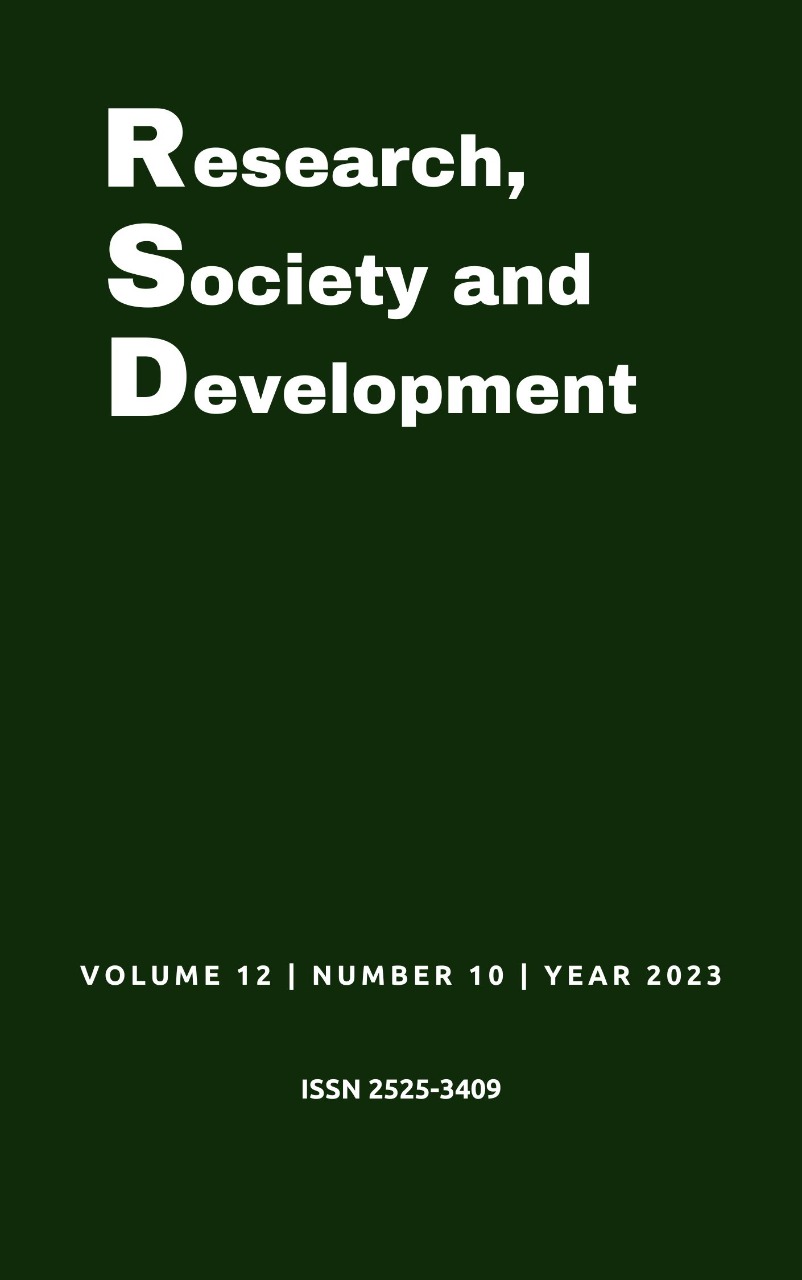Considerations on familial mediterranean fever
DOI:
https://doi.org/10.33448/rsd-v12i10.43559Keywords:
Familial mediterranean fever, Fever, Pathophysiology.Abstract
Introduction: Familial Mediterranean Fever (FMF) belongs to the group of autoinflammatory diseases, a class that is characterized by the dysregulation of the innate immune system, causing a characteristic clinical picture. Objective: The aim of this study was to evaluate the clinical, epidemiological and pathophysiological aspects of familial Mediterranean fever, building knowledge based on case reports and consolidated scientific evidence. Materials and Methods: This is an integrative literature review on the general clinical characteristics of familial Mediterranean fever. The PICO strategy was used to develop the guiding question. In addition, the descriptors "Mediterranean Fever"; "Familial Fever"; "Pathophysiology" were cross-referenced in the National Library of Medicine (PubMed MEDLINE), Scientific Electronic Library Online (SCIELO), Ebscohost, Google Scholar and Virtual Health Library (VHL) databases. Results and Discussion: The studies show that FMF involves specific nuances within medicine, including historical, pathophysiological, clinical, epidemiological and therapeutic aspects. Conclusion: Autoinflammatory diseases are recently described entities and among them is FMF, a condition that is caused by mutations in the MEFV gene, which are responsible for a characteristic picture of fever, serositis and skin lesions similar to erysipelas, in association with other findings. This pathology requires continuous treatment, as well as the structuring of a therapy that covers acute crises and prevents progression to unfavorable prognoses.
References
Alghamdi, M. (2017). Familial Mediterranean fever, review of the literature. Clinical Rheumatology, 36(8), 1707–1713. https://doi.org/10.1007/s10067-017-3715-5
Ben-Chetrit, E., & Yazici, H. (2019). Familial Mediterranean fever: different faces around the world. Clinical and Experimental Rheumatology, 37 Suppl 121(6), 18–22.
Bouomrani, S., Masmoudi, I., & Ben Teber, S. (2020). Familial Mediterranean fever: What associations to screen for? Reumatologia, 58(3), 150–154. https://doi.org/10.5114/reum.2020.96688
Celli, A., Crensiglova, C., & Pinto, S. S. M. (2016). Febre familiar do mediterrâneo - relato de caso. Jornal Paranaense de Pediatria, 67–70.
Hotta, Y., Kawasaki, T., Kotani, T., Okada, H., Ikeda, K., Yamane, S., Yamada, N., Sekoguchi, S., Isozaki, Y., Nagao, Y., Murotani, M., & Oyamada, H. (2020). Familial Mediterranean fever without fever. Internal Medicine (Tokyo, Japan), 59(10), 1267–1270. https://doi.org/10.2169/internalmedicine.3175-19
Kharouf, F., Tsemach-Toren, T., & Ben-Chetrit, E. (2022). IL-1 inhibition in familial Mediterranean fever: clinical outcomes and expectations. Clinical and Experimental Rheumatology, 40(8), 1567–1574. https://doi.org/10.55563/clinexprheumatol/obb2ds
Korkmaz, C., Cansu, D. U., & Cansu, G. B. (2020). Familial Mediterranean fever: the molecular pathways from stress exposure to attacks. Rheumatology (Oxford, England), 59(12), 3611–3621. https://doi.org/10.1093/rheumatology/keaa450
Kucuk, A., Gezer, I. A., Ucar, R., & Karahan, A. Y. (2014). Familial Mediterranean Fever. Acta Medica (Hradec Kralove), 57(3), 97–104. https://doi.org/10.14712/18059694.2014.47
Lancieri, M., Bustaffa, M., Palmeri, S., Prigione, I., Penco, F., Papa, R., Volpi, S., Caorsi, R., & Gattorno, M. (2023). An update on familial Mediterranean Fever. International Journal of Molecular Sciences, 24(11), 9584. https://doi.org/10.3390/ijms24119584
Mansueto, P., Seidita, A., Chiavetta, M., Genovese, D., Giuliano, A., Priano, W., Carroccio, A., Casuccio, A., & Amodio, E. (2022). Familial Mediterranean fever and diet: A narrative review of the scientific literature. Nutrients, 14(15), 3216. https://doi.org/10.3390/nu14153216
Mendonça, L. O. et al. (2017) Uma nova classe de doenças: doenças autoinflamatórias. Arquivos de Asmas Alergia e Imunologia, 1(3).
Nascimento, C. N. (2017). Febre Mediterrânica Familiar – Caso clínico e revisão bibliográfica. Faculdade de Medicina da Universidade de Lisboa.
Ozdogan, H., & Ugurlu, S. (2017). Canakinumab for the treatment of familial Mediterranean fever. Expert Review of Clinical Immunology, 13(5), 393–404. https://doi.org/10.1080/1744666x.2017.1313116
Ozdogan, H., & Ugurlu, S. (2019). Familial Mediterranean fever. Presse Medicale (Paris, France: 1983), 48(1), e61–e76. https://doi.org/10.1016/j.lpm.2018.08.014
Ozen, S. (2021). Update in familial Mediterranean fever. Current Opinion in Rheumatology, 33(5), 398–402. https://doi.org/10.1097/bor.0000000000000821
Rigante, D., & Manna, R. (2019). Familial Mediterranean fever: Assessing the overall clinical impact and formulating treatment plans. Mediterranean journal of hematology and infectious diseases, 11(1), e2019027. https://doi.org/10.4084/mjhid.2019.027
Souza, M. T. De; Silva, M. D. Da; & Carvalho, R. De.(2010). Integrative review: what is it? How to do it? Einstein (Sao Paulo, Brazil), 8(1), 102–106, 2010.
Stella, A., Lamkanfi, M., & Portincasa, P. (2020). Familial Mediterranean fever and COVID-19: Friends or foes? Frontiers in immunology, 11. https://doi.org/10.3389/fimmu.2020.574593
Terreri, M. T. R. A., Bernardo, W. M., Len, C. A., Silva, C. A. A. da, Magalhães, C. M. R. de, Sacchetti, S. B., Ferriani, V. P. L., Piotto, D. G. P., Cavalcanti, A. de S., Moraes, A. J. P. de, Sztajnbok, F. R., Oliveira, S. K. F. de, Campos, L. M. A., Bandeira, M., Santos, F. P. S. T., & Magalhães, C. S. (2016). Diretrizes de conduta e tratamento de síndromes febris periódicas associadas a febre familiar do Mediterrâneo. Revista brasileira de reumatologia, 56(1), 37–43. https://doi.org/10.1016/j.rbr.2015.08.006
Tufan, A., & Lachmann, H. J. (2020). Familial Mediterranean fever, from pathogenesis to treatment: a contemporary review. Turkish journal of medical sciences, 50(7), 1591–1610. https://doi.org/10.3906/sag-2008-11
Wekell, P., & Wester, T. (2022). Familial Mediterranean fever may mimic acute appendicitis in children. Pediatric Surgery International, 38(8), 1099–1104. https://doi.org/10.1007/s00383-022-05153-8
Yin, X., Tian, F., Wu, B., & Xu, T. (2022). Interventions for reducing inflammation in familial Mediterranean fever. The Cochrane Library, 2022(3). https://doi.org/10.1002/14651858.cd010893.pub4
Downloads
Published
Issue
Section
License
Copyright (c) 2023 Gabriel Vilela de Paulo Rodrigues; Mario de Paula Ferreira Neto; Suelen Ribeiro Miranda Pontes Duarte

This work is licensed under a Creative Commons Attribution 4.0 International License.
Authors who publish with this journal agree to the following terms:
1) Authors retain copyright and grant the journal right of first publication with the work simultaneously licensed under a Creative Commons Attribution License that allows others to share the work with an acknowledgement of the work's authorship and initial publication in this journal.
2) Authors are able to enter into separate, additional contractual arrangements for the non-exclusive distribution of the journal's published version of the work (e.g., post it to an institutional repository or publish it in a book), with an acknowledgement of its initial publication in this journal.
3) Authors are permitted and encouraged to post their work online (e.g., in institutional repositories or on their website) prior to and during the submission process, as it can lead to productive exchanges, as well as earlier and greater citation of published work.


